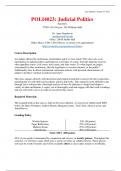Summary
Summary judicial politics
- Course
- Institution
Course Description Are judges affected by institutions around them and if so, how much? This class acts as an introduction to judicial politics and behavior in all types of courts: from the Supreme Court to other appellate courts, civil courts, trial courts, and state courts. To what degree ar...
[Show more]



